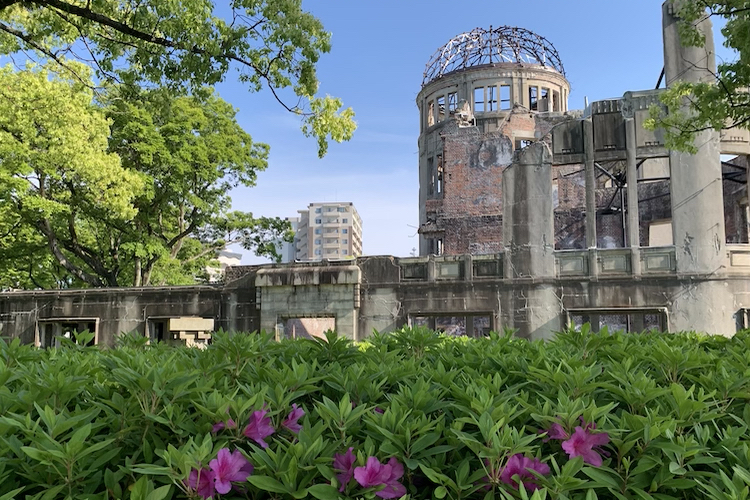By Tomohiko Aishima* & Shahin Ashraf**
TOKYO, 25 May 2023 (IDN) — When the leaders of powerful nations meet, finding ways to maintain peace is one of their most important responsibilities. But as the G7 meeting in Hiroshima has come to an end, some of the world’s most powerful leaders have let two opportunities to further the cause of peace slip through their grasp.Their first missed opportunity is in failing to take substantive steps to enhance momentum of supporting the Treaty on the Prohibition of Nuclear Weapons (TPNW), despite the historic significance of the Summit being held in Hiroshima. The second is in the area of climate change.
Many people still think of climate change solely as an environmental concern, which it certainly is. More acidic oceans kill coral reefs. Shifting seasons modify habitats for almost every species of life on the planet. 2020 wildfires in Australia were responsible for the deaths of 1 billion animals. The ecological toll is grave.
However, more and more people recognize the impact of climate change on peace and security and how it makes conflict more likely on a communal, domestic, and international level.
There are many ways in which climate change makes violence more probable. Climate-induced droughts, floods and other extreme weather events damage crops, reduce the availability of water, and increase food insecurity and poverty. Climate change displaces people from their homes and forces them to migrate elsewhere in search of survivable living conditions. This leads to conflict over resources including land, water and food—especially if resources are already scarce.
For example, in 2021, climate-driven water shortages led to an explosion of violence in Cameroon’s Far North Region between fishing, farming, and herding communities. The violence was responsible for hundreds of deaths and more than 50,000 refugees seeking refuge in neighboring Chad, itself facing overwhelming challenges related to the drought that had afflicted the region. In countries including Niger and Mali we also see fierce local conflict over dwindling water supplies and pasture.
Women are particularly vulnerable to the violence unleashed by a hotter planet. UN Environment estimates that 80% of displaced people are women and girls, who face dramatically increased risks of sexual violence and exploitation as refugees.
So are young people. UNICEF reports that over 50 million children have been forced from their homes by climate change. We tremble at the thought of the emotional trauma and physical dangers that they face as a result.
The answer to the climate crisis has been clear for decades. We must accelerate renewable energy development and phase out the use of fossil fuels as rapidly as possible.
We must provide an equitable transition for those impacted by the crisis; workers, communities, families alike.
We also call on wealthy governments to provide funding for climate-related loss and damage because people in poorer and more vulnerable nations are already suffering and will suffer more in the future. These countries have done little to nothing to cause the climate crisis, yet feel the greatest impacts.
There is no moral universe in which the world’s most vulnerable countries and communities should bear the brunt of such costs of climate change.
This is why we, along with hundreds of other religious institutions around the world, have joined a call for a Fossil Fuel Non-Proliferation Treaty. Such a treaty, also endorsed by cities, scientists and now a number of nation states, would establish three interconnected and essential commitments—the pillars of a sustainable future.
First, it would require an immediate end to new fossil fuel project development, which is the precondition for solving the climate crisis.
Second, it would delineate the pathway for a fair phase-out of existing coal, oil and gas production, allowing more vulnerable nations more time to make an energy transition.
Third, it would require funding for climate-related loss and damage and for a just transition to enable impacted workers and communities to undertake the job training, community redevelopment, and related redevelopment that the energy transition would require.
None of these conditions are easy. But it could not be more clear that these are the right steps to take.
So as the G7 meeting ends, we call on people of different religions and goodwill around the world to learn more about this issue, to speak out in public, and to work within your communities to support change. Governments need to know that we understand what is at stake, that we care, and that they must act. Failure to act will cause irreparable damage to the ecosystems on which human civilization depends, and to hundreds of millions of the world’s most climate-vulnerable families. Principled, ambitious, rapid action can create a better future for all.
The choice is beyond doubt.
*Tomohiko Aishima is Executive Director for Peace and Global Issues, Soka Gakkai International, a global, community-based Buddhist organization with a membership of over 12 million people that promotes peace, culture and education on the dignity of life. **Shahin Ashraf MBE is Head of Global Advocacy at Islamic Relief, a development agency reaching 13 million people in 34 countries to reduce the impact of conflict, natural disaster and climate breakdown and empower communities to emerge from poverty and vulnerability. [IDN-InDepthNews]
Photo: Hiroshima Peace Memorial (Genbaku Dome). Photo Credit: SGI
Visit us on Facebook and Twitter.
IDN is the flagship agency of the Non-profit International Press Syndicate.
We believe in the free flow of information. Republish our articles for free, online or in print, under Creative Commons Attribution 4.0 International, except for republished articles with permission.

